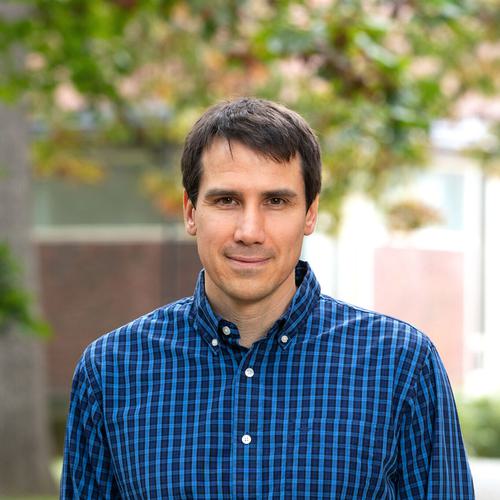
Jeffrey Wetter
Assistant Teaching Professor in Physics
I am interested in high energy particle physics, cosmology, and best practices in physics education.
My Ph.D. research focused on the experimental search for the Higgs Boson using the ATLAS detector at the Large Hadron Collider in Geneva, Switzerland. The Higgs Boson decays almost instantly upon being created into other, more stable particles. Thus, direct observation of the Higgs Boson is impossible. Instead, scientists take ‘pictures’ of these decay products and then attempt to work backwards in order to gain information about the Higgs. Imagine taking a picture of an explosion and trying to work backwards to figure out what just exploded. My particular research focused on instances in which the Higgs Boson decayed into W bosons, which then further decayed into electrons, muons, and neutrinos. The day-to-day work of this type of research is mostly writing computer programs designed to quickly analyze data.
I strive to make physics accessible and engaging to as many students as possible. To this end I attempt to implement best practices in physics education including ‘active learning’ and ‘flipped classroom’ approaches. These techniques involve giving students recorded lectures before class begins and then using class time to allow students to solve sample problems, engage in active demonstrations, and ask questions about the material.
At Wellesley this year I am teaching PHYS 104, 106, and 305. At previous institutions I have worked to develop new physics and engineering curriculum including designing a full 2-year electrical engineering degree and redesigning all introductory physics laboratories.
Since leaving graduate school I have become interested in theoretical physics in topics including particle physics, cosmology, and general relativity. I am happy to work with students on research projects in any of these areas.
Outside of physics I love being outdoors and participate in lots of outdoor activities including, but not limited to, hiking, running, swimming, rock climbing, golf, skiing, and tennis. When I was younger, I spent a winter teaching skiing at Mammoth Resort in California. I have also traveled around the US and Europe rock climbing. I also enjoy chess, poker (but not for money!), and video games.
Education
- B.A., Middlebury College
- M.S., Tufts University
- Ph.D., Tufts University